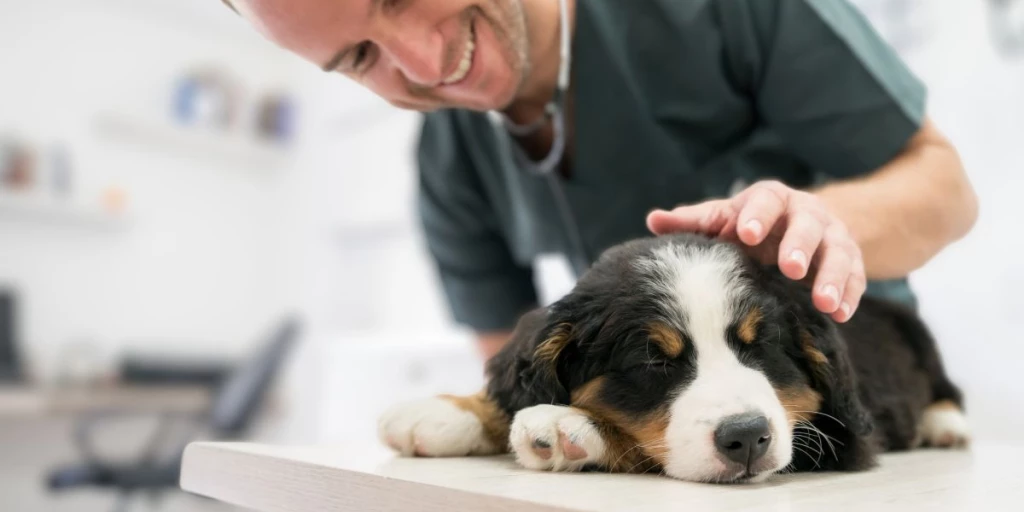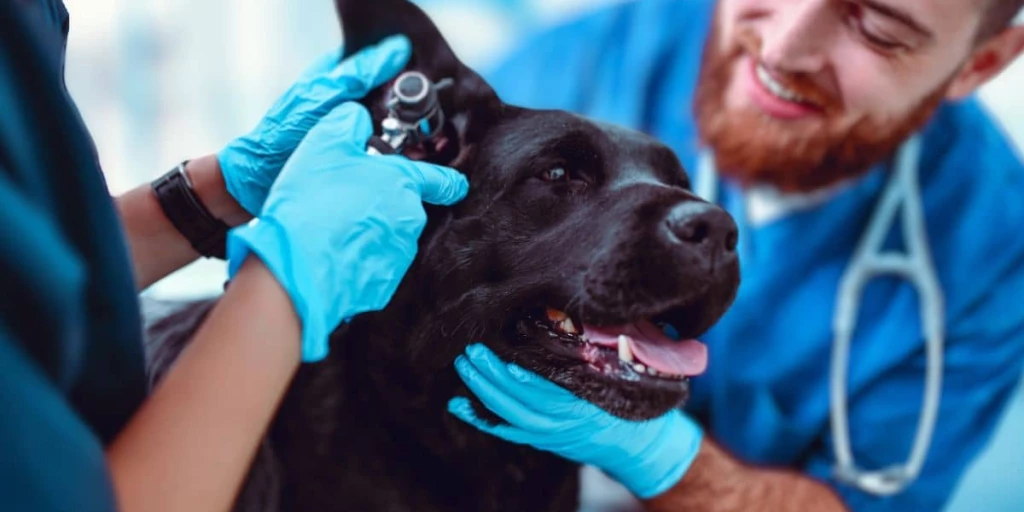Know all preventive examinations in dogs and learn, according to the age of the dog, how to recognize, avoid, and treat diseases to maintain canine health for a long time.
- Why are Preventive Examinations Important?
- Puppies: Health Checks in the First Months
- Preventive Examination for Adolescent Dogs and during Puberty
- Puberty: The Crucial Phase
- Health Care for Adult Dogs
- Health Checks for Senior Dogs
- Take the stress off your furry friend: Check-ups at home
- Frequently Asked Questions
Key Points:
- Health checks help detect diseases early.
- An individual examination does not replace a preventive examination.
- Puppies receive their preventive examination during the first vaccinations.
- Adolescent dogs should be examined upon reaching sexual maturity.
- Special examinations for older dogs are recommended from 7 to 9 years old.
- House visits are the most relaxed preventive examinations.
Why are Preventive Examinations Important?
Preventive examinations or health checks aim to detect signs of impending or ongoing diseases early. Even though these check-ups and visits to the veterinarian are often associated with stress, it’s crucial not to skimp, as it concerns the health of your furry friend.
The earlier a disease is identified, the better it can generally be treated or at least controlled, as irreversible damage often occurs only with the progression of the disease.
Some diseases or pains can even be entirely avoided if initial signs are noticed promptly (e.g., dental misalignments). Therefore, it’s essential to inspect your dog regularly and pay attention to any changes.
However, this doesn’t replace the health check by your veterinarian, which should also be done at regular intervals.
Below, I provide an overview of which examinations are advisable at different times.
Puppies: Health Checks in the First Months

Usually, puppies are first vaccinated around 8 weeks of age. The first vaccination appointment also includes a general examination, which, in this case, usually serves as the initial preventive examination.
During this visit, the veterinarian checks whether the movement pattern and activity correspond to the age and palpates your dog from head to tail.
Additionally, the vet examines ears, eyes, oral cavity, skin, genital organs, and anus for abnormalities and pays particular attention to the teeth since puppies initially have milk teeth that later change. Usually, the heart and lungs are also auscultated, and the temperature is measured.
Overview of Preventive Examinations for Puppies:
- Vaccinations at 8, 12, and 16 weeks
- Possibly, check and change of teeth at around 6–7 months
- Possibly additional examinations for breed-specific or familial diseases
- For other abnormalities
Preventive Examination for Adolescent Dogs and during Puberty
The next routine veterinary appointment usually occurs around 1–1.5 years of age for the next vaccination (around 16 months).
During this period, your pet undergoes many changes, which you should observe. In case of uncertainties or abnormalities, consult a veterinarian.
Overview of Preventive Examinations for Adolescent Dogs:
- Vaccination at around 16 months
- Several times a year (depending on risk, approximately every 3 months) deworming or fecal examination
- Possibly examination upon entering sexual maturity, especially for genital or mammary abnormalities in females or behavioral abnormalities
- Possibly hip/elbow x-rays or other breeding suitability examinations
- For other abnormalities
For example, some diseases often become more apparent with the growth to the final body size (e.g., respiratory problems in short-nosed breeds). Allergies also tend to develop within the first few years of life (evident in symptoms like itching, increased paw licking, or diarrhea).
Some diseases are related to an immature immune system, such as inflammation of the eyes or genital organs (e.g., eye or vaginal discharge).
Puberty: The Crucial Phase

A physically and psychologically crucial phase during this time is puberty, the onset of sexual maturity. In males, the testicles undergo changes, increasing in size, and some males may develop genital discharge (so-called preputial catarrh), leading to increased genital licking.
Females experience their first heat at around 6–18 months and become sexually mature from that point on. As an owner, it is essential to observe the female during and after heat and consult a veterinarian if there are any abnormalities (e.g., pseudopregnancy after heat).
Maintaining a kind of “cycle diary” for your female dog is also advisable, as changes in the cycle can be indicative of diseases. In this context, preventive examinations at the veterinarian can be helpful to ensure that your pet’s puberty progresses normally.
Additionally, during such a visit, you can seek advice on topics such as castration.
At around one year of age, additional examinations may be recommended or required by the breeding association, especially concerning hereditary diseases, such as X-rays of hips or elbows or other breeding suitability examinations.
Health Care for Adult Dogs

Generally, adult dogs require an annual vaccination, during which a general examination is conducted each time. Even if you choose not to vaccinate your dog, you should still have a yearly check-up by the veterinarian.
Depending on whether your dog has known diseases or you simply want a more comprehensive check-up, the general examination can be supplemented with blood tests, urine analysis, and possibly blood pressure measurement, for example.
Overview of Preventive Examinations for Adult Dogs:
- 1 vaccination with examination per year
- Several times a year (depending on risk, approximately every 3 months) deworming or fecal examination
- Possibly more comprehensive check-up with blood tests approximately every 2–3 years
- Possibly (recurring) dental cleaning
- For other abnormalities
Regular fecal examination (several times a year) is particularly recommended if your dog is not routinely dewormed with medication. However, it may also be useful independently, for example, in cases of recurrent diarrhea or increased risk of parasitic diseases.
If your pet shows abnormalities or has abnormal values in the mentioned examinations, ultrasound and X-rays should also be considered.
Especially in intact dogs, the reproductive organs should be regularly examined by the veterinarian: in males, this includes palpating and inspecting the testicles, penis, and possibly ultrasound examination of the prostate. In females, the vulva and mammary glands are inspected and palpated, and possibly an ultrasound examination of the uterus is performed.
Many dogs develop deposits or tartar on their teeth over time, which can be associated with inflammation of the gums or tooth roots. For some animals, this is necessary at regular intervals.
Health Checks for Senior Dogs
From around 7–9 years of age, your dog is considered a “senior.” However, this is only a rough estimate, as the aging process can vary significantly from individual to individual, depending on the breed and overall life expectancy.
Smaller dogs generally age somewhat slower and live longer than larger breeds.
Overview of Preventive Examinations for Senior Dogs:
- 1 vaccination with a general examination per year
- 1 to 2 general examinations with blood tests per year (so-called “geriatric blood profile”)
- Possibly 1 to 2 abdominal ultrasounds per year
- Possibly heart ultrasound/EKG, especially for vulnerable breeds (e.g., Doberman), if abnormalities are detected during heart auscultation, or before anesthesia
- Possibly recurring dental cleanings
- Several times a year (depending on risk, at least every 3 months) deworming or fecal examination
- For other abnormalities
From around 8 years of age, regular “senior check-ups” are recommended. These can take place as part of the annual vaccination or independently and should always include at least a general examination.
Since many diseases only become visible when they are well advanced (e.g., kidney or liver diseases), blood tests should be performed 1–2 times a year in older dogs to detect changes in blood values early and counteract potential diseases.
In addition, a urine test can be conducted, focusing on kidney function, bladder health, and possible indications of diabetes mellitus. Regular blood pressure measurement, recommended for humans as well, is also advisable. Depending on findings or if you notice abnormalities in your senior dog, additional examinations such as ultrasound and X-rays, possibly also heart ultrasound and EKG, may be necessary.
Take the stress off your furry friend: Check-ups at home
In conclusion, it can be said that preventive examinations are almost as important for dogs as they are for us humans, as dogs cannot express their pain and problems as clearly as we can.
If you are unsure whether specific examinations are advisable for your dog, it is best to have an open conversation with your veterinarian. The veterinarian can provide individual advice tailored to you and your pet’s needs and give you an approximate cost estimate for the examinations.
With felmo, you have a veterinarian by your side who comes to your home. This way, preventive examinations can be conducted in a familiar and stress-free environment.
Our veterinarian authors would like to emphasize that their blogs do not replace veterinary advice. Despite all the exciting information, you should always clarify important health decisions individually for your pet with your veterinarian. Therefore, we do not assume any liability for any damages that may arise from the use of the information presented in this blog. This article does not claim to be complete. (2023)
Frequently Asked Questions
What preventive examinations are there for dogs?
There are various preventive examinations for dogs that should be performed based on the age and life situation of the dog. These include vaccinations, blood tests, blood pressure measurement, regular deworming, fecal examinations, preventive examinations at the onset of sexual maturity, and examinations for older dogs. Regular examinations by a veterinarian are important to detect and treat diseases early.
How often should I take the dog for a check-up or to the vet?
A dog should be presented to the veterinarian at least once a year for vaccination and a general examination. For senior dogs, those around 7–9 years old, regular “senior check-ups” are recommended, which should include at least a general examination. Additionally, blood tests should be conducted 1–2 times a year for older dogs.
What does a general examination at the veterinarian include?
A general examination at the veterinarian usually includes listening to the heart and lungs, palpating the ears, eyes, oral cavity, skin, genital organs, and anus, as well as checking the teeth. Depending on the age and health of the dog, the examination can be more extensive, for example, with a blood test or urine analysis.


